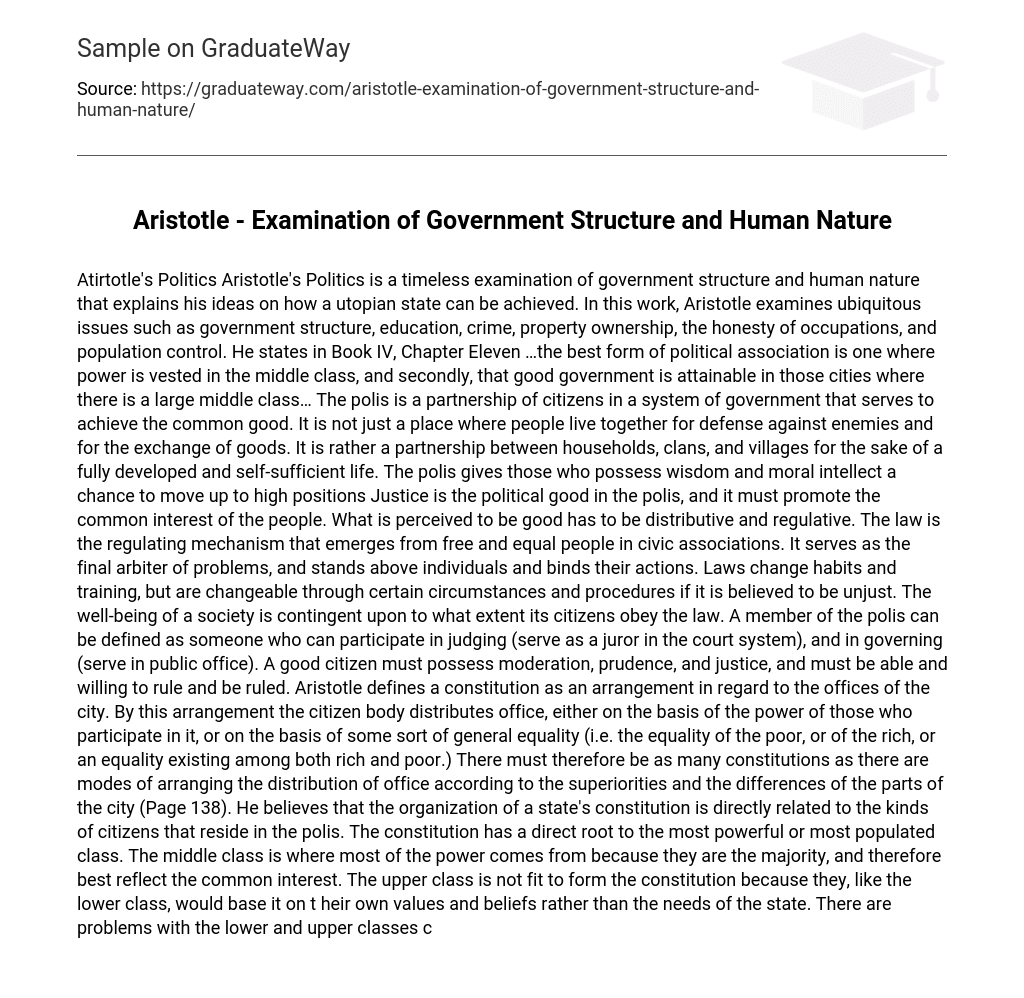Atirtotle’s Politics
Aristotle’s Politics explores government structure and human nature as it discusses his ideas on achieving a utopian state. The work delves into various topics including government structure, education, crime, property ownership, occupations’ integrity, and population control. In Book IV, Chapter Eleven, Aristotle asserts that the optimal political association is one that empowers the middle class and that cities with a substantial middle class can achieve good governance.
The polis is a partnership of citizens within a government system that aims to achieve the common good. It is more than just a place where people live together for defense and trade. Instead, it represents an alliance between households, clans, and villages with the goal of attaining a fully developed and self-sustaining life. In the polis, individuals with wisdom and moral intellect have the opportunity to rise to positions of power. Justice is considered the political benefit within the polis, and it must work towards the collective interest of the people. Perceived goodness must be distributed and regulated. The law, which arises from the free and equal citizens in civic associations, serves as the final arbitrator of issues and holds authority over individuals, binding their actions.
Laws can be changed through specific procedures if they are believed to be unjust, which can impact habits and training. The well-being of a society depends on how much its citizens comply with the law. A member of the polis is someone who can judge in court and participate in governing through public office. A good citizen must possess moderation, prudence, and justice, and should be willing to both rule and be ruled. According to Aristotle, a constitution is a system that arranges city offices. This arrangement can be based on the power of those involved or on some form of general equality, such as equality among the poor or the rich, or even both.
According to the author (Page 138), there must be as many constitutions as there are ways of organizing the distribution of power based on the strengths and differences of different parts of the city. The state’s constitution is closely linked to the type of citizens living in the city. The constitution originates from the most powerful or most populous social class. The middle class, being the majority, holds significant power and best represents the collective interest. The upper class is not suitable for forming the constitution because they, similar to the lower class, would prioritize their own values rather than the needs of the state. The creation of laws by the lower and upper classes presents challenges.
The government consistently exploits the lower class because of their limited wealth, status, and education in comparison to the upper-class. Consequently, they face difficulties in making meaningful contributions towards society’s welfare. Aristotle contends that the upper class, driven by excessive ambition, would prioritize laws that serve their own economic and social interests at the cost of the majority’s well-being.
The mentioned classes are composed of individuals with their own self-interests and desires, forming factions to oppose the system. This factional conflict arises from inequality, fueled by a desire for equality (Class Notes). In any society, the middle class serves as a balance between the concerns of the wealthy and the poor. Balance is found in this middle class that exists between the rich and the poor in every city (Page 156). Unlike the ambition of the wealthy or pettiness of the poor, it is not driven by either group. This leads to political unity. Therefore, a government based on this class, known as a ‘constitutional government’ or polity, would likely be beneficial overall. Such a government would avoid factionalism and maintain stability. Those who possess deliberative abilities and can give instruction should be eligible for positions within this government.
The ideal form of constitution would grant power to the middle class. The concept of moderation is closely associated with the golden mean, which can only exist when there is a substantial middle class population. Democracy is defined by freedom. Freedom encompasses two main aspects: being ruled and ruling in turn, as everyone is considered equal in terms of numbers, not qualifications, and having the ability to live according to one’s own desires. The majority should hold authority rather than a small group of individuals who are deemed the most suitable to govern. While not all members of the polis may be political scientists, they can still work more effectively together with their peers.
When individuals with excellence and intelligence unite, they form a single entity. The distinction between democracy and oligarchy lies in the difference between poverty and wealth. Oligarchy arises when rulers obtain power from wealth, regardless of their majority status. Tyranny can be considered as the worst of both evils. It embodies extreme distrust of the masses, akin to oligarchy, and extreme hostility towards the noteables, akin to democracy (Page 211).
Aristotle’s belief in the ideal form of government centered around merit. He argued that a constitutional government should combine elements of oligarchy and democracy. Despite individuals sharing a general understanding of justice, they frequently face challenges in attaining it due to their inclination to prioritize personal goals and desires. A successful government can strike a balance between people’s perception of justice and what is best for society as a whole. These principles put forth by Aristotle remain foundational to our current political system, leading him to be recognized as The Father of Political Science.





